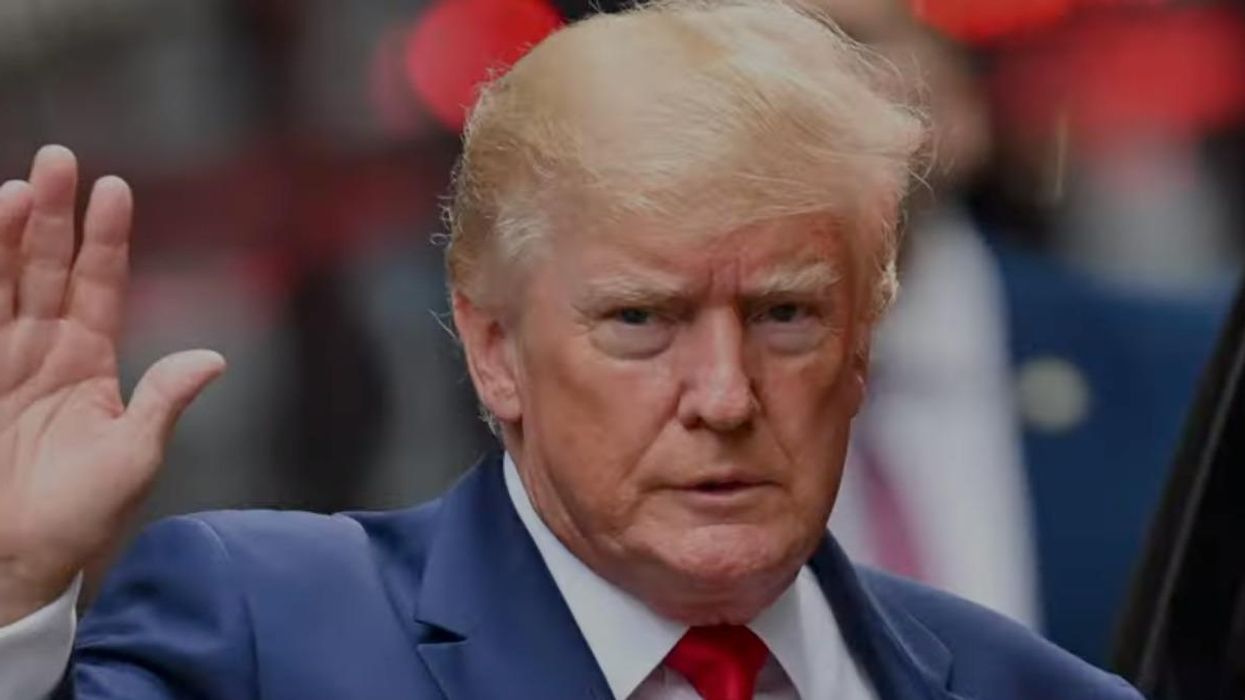Rejected In Court, Trump Motion On Classified Papers Provokes Laughter

Donald Trump
The most notable aspect of Donald Trump’s reaction to the FBI executing a search warrant at Mar-a-Lago has been the difference between what Trump has said in public, and what Trump attorneys have said in court. At rallies, in fundraising emails, and in the empty wastes of the Truth Social platform, Trump has flung spittle in all directions and accused the FBI, DOJ, National Archives, and President Biden of every form of harassment. But in court … crickets.
Finally, on Monday evening, Trump actually followed up two weeks of threats with some action. His crack legal team marched straight to the court of a judge that Trump appointed. There, they dropped a motion for a “special master” to oversee the handling of documents seized in the FBI search of Mar-a-Lago two weeks ago and for the return of some of the documents taken.
While this move finally allows Trump to address the “Why doesn’t he go to court?” question that popped up in any discussion of the FBI search, it generates a lot more questions. Like … why is it that Donald Trump never seems capable of securing anyone competent for his legal team? Because the biggest thing that Trump’s filing has generated from the legal community is laughter.
On Tuesday, the court had to tell Trump’s team they needed a do-over. Because they failed to even properly file the ridiculous motion.
And another update. The court—meaning the Trump-appointed judge hearing this case—has responded again by asking Trump’s legal team to answer a few questions. Questions like … what the hell is this thing?
JUST IN: Judge Aileen Cannon responds to Trump lawsuit re: FBI search with a list of more questions for Trump's team about what, precisely, they're asking for. pic.twitter.com/zCqsmEf86e
— Kyle Cheney (@kyledcheney) August 23, 2022
Trump’s team has submitted a complaint without a complaint, or a basis, or a proposed standing. Or just about anything that represents an issue that can be dealt with in court. So, after two strikes, the judge is giving Trump’s team a third swing at turning in something that makes sense.
What are the odds?
Basically, the judge is saying:
— emptywheel (@emptywheel) August 23, 2022
1) Why did you bring this to me rather than Judge Reinhart?
2) What can I do that Judge Reinhart can't?
3) You know, w/o an injunction, this is useless, right?
4) Why the fuck did you bring this to me?
5) You're supposed to tell DOJ about this. pic.twitter.com/Vs5ZGl2mjf
That Tuesday morning response from the court “denying without prejudice” Trump’s motion came for the simplest of all reasons: His legal team failed to follow the rules when submitting the motion.
A pro hac vice motion—a request from a lawyer who is accredited in another area, but not in the state in which it was filed—is both very common and well-defined. Still, Trump’s team got it done—where “it” meant screwing this up badly enough that they have to start over. What they got back in response was essentially the court saying, “You failed to fill in the form correctly. Go read the instructions and try again.”
While they’re in there crossing the T’s and dotting those I’s, Trump’s legal team might also want to reconsider some of the actual contents of the motion, all of which was apparently crafted for how it will read in Trump’s next “We need your $100 by midnight!” fundraising effort rather than meeting any legal standard. Lines like “Law enforcement is a shield that protects Americans. It can not be utilized as a weapon for political purposes” might be good for a Truth Social post, but don’t have any meaning in this context.
The motion calls the search of Mar-a-Lago, which was conducted after months of efforts from the National Archives and others to retrieve national security information stolen by Trump, a “shockingly aggressive move.” Trump also uses the filing for a hefty dose of simple whining, saying that the FBI and Department of Justice have long “treated him unfairly.”
But if the motion makes room for lots of chest-beating and Job-level of claims of rolling in ashes and potshards, there’s one thing it tellingly leaves out.
Also, when I file a motion, I use a weird trick: I identify the rule or statute I'm invoking that gives the court power to act and the rules governing the process. In criminal cases I cite criminal rules. And cases.
— EnoughTreesHat (@Popehat) August 22, 2022
That stuff—the statute which Trump’s team is invoking in this request for a special master and the return of some documents and citations of existing case law—is missing in action from the motion.
Special masters are court-appointed experts who can help judges with a variety of tasks. Over the past year, for instance, several judges across the country tapped special masters in redistricting cases to draw new maps. They’ve been used to investigate claims of voter fraud, such as in 1948 when the Republican Party lodged claims of fraud against the campaign of then Sen. Lyndon Johnson. Frequently, special masters are used to sort potential issues of attorney-client privilege when it comes to documents involved in a criminal trial. For example, the judge in the prosecution of former Trump attorney Michael Cohen appointed just such a special master to weed out any documents between Cohen and Trump that would be protected by attorney-client privilege.
But exactly what law, regulation, or precedent Trump’s attorneys are citing remains a mystery. So does where Trump gets the idea that he can ignore every past regulation and ruling concerning the limits of executive privilege. Doing any research before filing this motion was apparently too much of a bother.
As MSNBC’s Rachel Maddow reported on Monday, this is far from the only reason attorneys are “giggling” at Trump’s motion. First off, this kind of request is usually made immediately after, or even during, a search of documents in question. That Trump’s team waited two weeks demonstrates that they have no actual concern about the documents being read by the FBI, and that this is all for show.
Second, the claims about how “aggressive” the FBI search was are sharply undercut by the evidence that shows how the National Archives, White House, and DOJ absolutely bent over backward in an effort to allow Trump to return the documents without generating exactly this kind of incident. Compare this question from Trump’s motion:
Why raid my home with a platoon of federal agents when I have voluntarily cooperated with your every request?
With this paragraph from the Acting Archivist of the United States to Trump’s attorneys on May 10:
As the Department of Justice’s National Security Division explained to you on April 29, 2022: There are important national security interests in the FBI and others in the Intelligence Community getting access to these materials. According to NARA, among the materials in the boxes are over 100 documents with classification markings, comprising more than 700 pages.
Trump was given the reasons, he was given the time to respond, and he did respond—by stalling over and over and refusing to hand over classified documents that contained “important national security interests.”
As Marcy Wheeler writes at emptywheel, Trump’s document is a lot of things. Including:
- A confession to a violation of the Espionage Act
- A confession to making a threat against the Attorney General
- A legal shit show
- Serial proof that a Trump search was conducted like other searches
- Filed in the wrong place at the wrong time
- Probably written in significant part by Kash Patel
- Not backed by sworn declarations to substantiate its “factual claims”
- An invocation not of special master reviews by Trump’s own personal attorneys but instead an invocation of a terrorist lawyer convicted of conspiring with that terrorist.
But it is not a serious legal document, much less the “significant fourth amendment challenge” Trump insisted he would file. Or, in other words …
I mean this is shitty on every level. It's shitty strategy, shitty lawyering, shitty writing, shitty organization. It's even shitty as propaganda. It's just incompetent.
— EnoughTreesHat (@Popehat) August 22, 2022
Trump initiated his case against the United States by filing a motion. That appears to contravene Rule 3 of the FRCP, which requires civil cases to begin with a complaint. But the court staff have just docketed Trump’s motion as a complaint. I wonder whether DOJ will object that. pic.twitter.com/ImGn7r8Eeo
— southpaw (@nycsouthpaw) August 23, 2022
Reprinted with permission from Daily Kos.
- Trump Lawyer Claims FBI Searched Mar-a-Lago Because Cheney Lost Primary - National Memo ›
- Trump Aide Says He Used Classified Documents As 'Scrap Paper' - National Memo ›
- How Former Aide Molly Michael Became Trump's 'Witness From Hell' - National Memo ›
- Humiliation, Degradation, Dehumanization: Human Dignity Violated ... ›
- Press Coverage of the Refugee and Migrant Crisis in the EU: A ... ›
- 14th Amendment US Constitution--Rights Guaranteed Privileges ... ›
- Mapping the Margins: Intersectionality, Identity Politics, and Violence ... ›
- Trump Declares a National Emergency, and Provokes a ... ›








